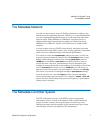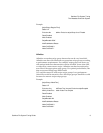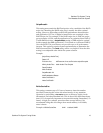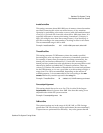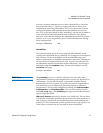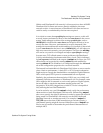
StorNext File System Tuning
The Metadata Controller System
StorNext File System Tuning Guide 12
severely consumes metadata space in cases where the file-to-directory
ratio is less than 100 to 1. However, startup and failover time can be
minimized by increasing FsBlockSize. This is very important for multi-
terabyte file systems, and especially when the metadata servers have
slow CPU clock speed (such as Sparc and Mips). A good rule of thumb is
to use 16K unless other requirements such as directory ratio dictate
otherwise. Note that this setting is not adjustable after initial file system
creation, so it is very important to give it careful consideration during
initial configuration.
Example:
FsBlockSize 16K
JournalSize 0
The optimal settings are in the range between 16M and 64M. Avoid
values greater than 64M due to potentially severe impacts on startup and
failover times. Values at the higher end of the 16M-64M range may
improve performance of metadata operations in some cases, although at
the cost of slower startup and failover time. A good rule of thumb is to
use 16M unless another requirement dictates differently. This setting is
adjustable using the
cvupdatefs utility. For more information, see the
cvupdatefs man page.
Example:
JournalSize 16M
SNFS Tools 0
The snfsdefrag tool is very useful to identify and correct file extent
fragmentation. Reducing extent fragmentation can be very beneficial for
performance. You can use this utility to determine whether files are
fragmented, and if so, fix them. If your files are prone to fragmentation
you should also use the FSM config file tuning options to minimize
fragmentation. These global configuration settings are
InodeExpandMin,
InodeExpandInc, and InodeExpandMax. (For more information, see the
man
cvfs_config page.) The snfsdefrag man page explains the command
options in greater detail.
FSM hourly statistics reporting is another very useful tool. This can show
you the mix of metadata operations being invoked by client processes, as
well as latency information for metadata operations and metadata and
journal I/O. This information is easily accessed in the cvlog log files. All
of the latency oriented stats are reported in microsecond units.






